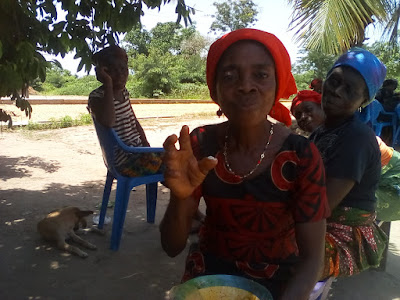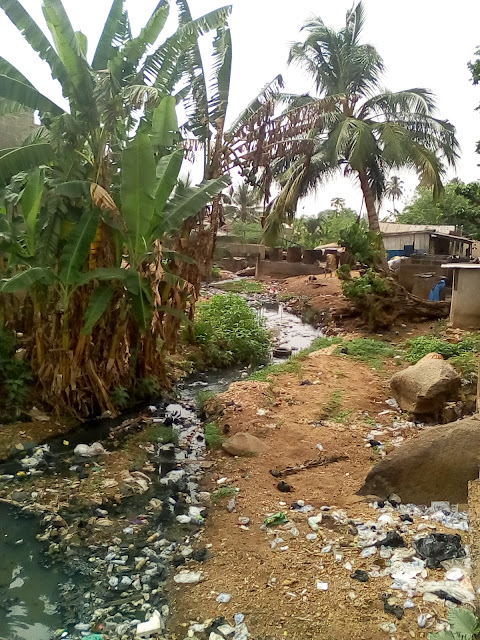Ask a Ghanaian, Part I
So if you're reading this blog, I'd imagine you are at least a little interested in learning more about Ghana. Or hey, maybe you just like to giggle at the image of me struggling to wield a hoe or flailing around trying to kick a soccer ball.
Yeah, I struggle sometimes.
But for those of you interested in learning about Ghana, I'm afraid maybe I've let you down a little bit. I've only been in Ghana for ten months. Moreover, no matter how integrated I may feel, no matter how much I learn, I will never, ever be able to explain Ghana like Ghanaians do. My perspective will always be that of an outsider.
So I decided to interview some people who might actually know what they're talking about: Ghanaians.
These brothers, Noah and Bright, are good friends with one of my fellow PCVs, and over the months I've been here, they've become friends of mine, too. I decided to sit down with them and ask some questions to get their perspective on life in Ghana. Here's what they had to say to a few of the questions I asked them.
What do you think is the biggest difference between Ghanaians and Americans?
Bright: The only difference is complexion.
What about the biggest difference between America and Ghana?
Bright: There's something I know about Americans: they love chilling. Americans love chilling. They always spend time for themselves. They don't want to always work. When Americans work for six hours, they will rest--
Noah: --get paid--
Bright: But here in Ghana, they don't want to rest. When someone is working in the night, day time he's supposed to rest, but you see him doing another thing. They don't want to rest. They don't have time. That's why most of them, they wake up, see their families, they leave. They don't have time for their family, their wives, their husbands. Americans, you can see them with their families. They can just go to a place now, and stand there, chat, have fun, play together. Happy family. And then they go home.
What is the best thing about being a Ghanaian?
Bright: Freedom and peace. That's one thing about Ghana.
Noah: We have crises in so many countries. In Ghana, we have crises, but--it's better [...] You make your business, make your money. You don't trouble anybody, nobody troubles you.
Bright: Ghana is free. We are not afraid. You wake up, everything is good.
Are there any challenges about life in Ghana?
Noah: Not really.
Bright: We've not gotten to that level. Say we finish our university, we are seeking for job, we're not getting job--we can say there is no jobs here.
What do you think Ghana will be like fifty years from now?
Bright: Fifty years?
Noah: Paradise. Ghana paradise.
Bright: Maybe, maybe. A president can come and change the whole system. A good person can change the whole system.
What kind of changes do you mean?
Bright: We just don't want things to be hard.
Noah: We need to increase science and technology, especially in this country. If you expose more young people to the things in the world, things that are trending now--especially through education, computers, how to make things. See me, I know so many things, but since I'm in the village, nobody knows about me. [The government] should try to explore [the villages].
Bright: They should try to get big geniuses. There are lots of geniuses in the villages.
Noah: People are great now in the world, but if you know their background, you know they started from [a] very low background. The government should go into villages and get more people. They can build Ghana into a better place.
Thanks, Bright and Noah, for agreeing to be my first interviewees! For all the Americans out there reading this: I'm going to try to do a post like this once a month or so. So if you have any burning questions you'd like to have answered, let me know!
DISCLAIMER:ALL OPINIONS REPRESENTED IN THIS POST ARE THE VIEWS OF THE SPEAKERS. THEY DO NOT NECESSARILY REFLECT MY VIEWS NOR THOSE OF PEACE CORPS GHANA.
Yeah, I struggle sometimes.
But for those of you interested in learning about Ghana, I'm afraid maybe I've let you down a little bit. I've only been in Ghana for ten months. Moreover, no matter how integrated I may feel, no matter how much I learn, I will never, ever be able to explain Ghana like Ghanaians do. My perspective will always be that of an outsider.
So I decided to interview some people who might actually know what they're talking about: Ghanaians.
 |
| (Left-right) Noah, 20 years old; Bright, 23 years old. |
These brothers, Noah and Bright, are good friends with one of my fellow PCVs, and over the months I've been here, they've become friends of mine, too. I decided to sit down with them and ask some questions to get their perspective on life in Ghana. Here's what they had to say to a few of the questions I asked them.
What do you think is the biggest difference between Ghanaians and Americans?
Bright: The only difference is complexion.
What about the biggest difference between America and Ghana?
Bright: There's something I know about Americans: they love chilling. Americans love chilling. They always spend time for themselves. They don't want to always work. When Americans work for six hours, they will rest--
Noah: --get paid--
Bright: But here in Ghana, they don't want to rest. When someone is working in the night, day time he's supposed to rest, but you see him doing another thing. They don't want to rest. They don't have time. That's why most of them, they wake up, see their families, they leave. They don't have time for their family, their wives, their husbands. Americans, you can see them with their families. They can just go to a place now, and stand there, chat, have fun, play together. Happy family. And then they go home.
What is the best thing about being a Ghanaian?
Bright: Freedom and peace. That's one thing about Ghana.
Noah: We have crises in so many countries. In Ghana, we have crises, but--it's better [...] You make your business, make your money. You don't trouble anybody, nobody troubles you.
Bright: Ghana is free. We are not afraid. You wake up, everything is good.
Are there any challenges about life in Ghana?
Noah: Not really.
Bright: We've not gotten to that level. Say we finish our university, we are seeking for job, we're not getting job--we can say there is no jobs here.
What do you think Ghana will be like fifty years from now?
Bright: Fifty years?
Noah: Paradise. Ghana paradise.
Bright: Maybe, maybe. A president can come and change the whole system. A good person can change the whole system.
What kind of changes do you mean?
Bright: We just don't want things to be hard.
Noah: We need to increase science and technology, especially in this country. If you expose more young people to the things in the world, things that are trending now--especially through education, computers, how to make things. See me, I know so many things, but since I'm in the village, nobody knows about me. [The government] should try to explore [the villages].
Bright: They should try to get big geniuses. There are lots of geniuses in the villages.
Noah: People are great now in the world, but if you know their background, you know they started from [a] very low background. The government should go into villages and get more people. They can build Ghana into a better place.
Thanks, Bright and Noah, for agreeing to be my first interviewees! For all the Americans out there reading this: I'm going to try to do a post like this once a month or so. So if you have any burning questions you'd like to have answered, let me know!
DISCLAIMER:ALL OPINIONS REPRESENTED IN THIS POST ARE THE VIEWS OF THE SPEAKERS. THEY DO NOT NECESSARILY REFLECT MY VIEWS NOR THOSE OF PEACE CORPS GHANA.



Comments
Post a Comment